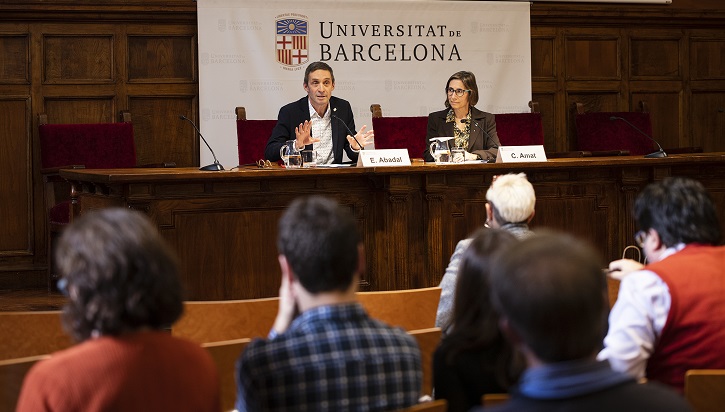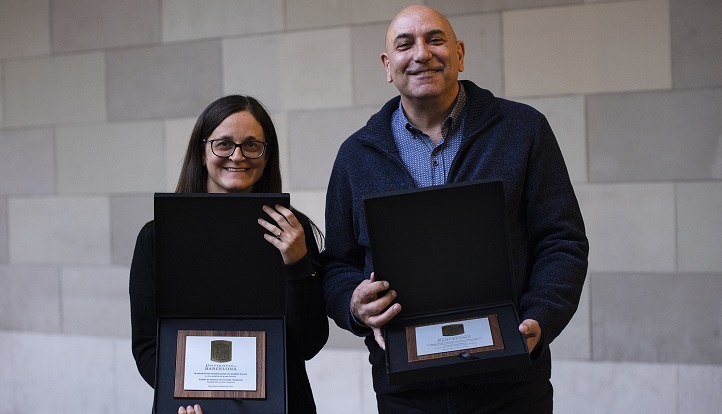The UB commemorates 20 years of teaching evaluation and sets out its lines of action for the future

There is a need for institutional recognition of university teaching and the task of assessing its quality. This was expressed on many occasions during the conference commemorating the twentieth anniversary of the evaluation of the teaching activity of the teaching staff at the University of Barcelona. During these sessions, the future changes in the way this assessment is carried out and its implications for universities, in particular for the careers of teaching staff, were discussed.

There is a need for institutional recognition of university teaching and the task of assessing its quality. This was expressed on many occasions during the conference commemorating the twentieth anniversary of the evaluation of the teaching activity of the teaching staff at the University of Barcelona. During these sessions, the future changes in the way this assessment is carried out and its implications for universities, in particular for the careers of teaching staff, were discussed.
This commemoration coincides with the publication of a new website on teaching evaluation, which contains all the necessary information to participate in the evaluation process explained in a didactic way, as well as the latest news and the main data of the calls for teaching evaluation that have been made to date.
Ernest Abadal, Deputy Vice-Rector for Teaching and Research Staff, spoke at the opening of the conference to highlight the diversity of indicators and evidence currently included in the evaluation of teaching. He also highlighted the work of the UB's Teaching Assessment Committee (CADUB) and defended the importance of dedicating "institutional recognition to teaching" with initiatives such as the chairs for teaching excellence.
Idoia Fernández then reported on the updates of the teaching activity evaluation programme that have been initiated at the University of the Basque Country. She commented on the different standards that are used and explained that they have established four levels of teaching staff, which are reached as the teaching activity develops throughout the academic career: first there is a minimum threshold, with the quality criteria that must be guaranteed in any situation; then there is a second level, of good teaching quality, and the last levels correspond to excellence and leadership in university teaching. Finally, Fernández recalled the importance of a long-term view to implement improvements in teaching evaluation and the relevance of the institution's support. "Better teachers mean better universities," he concluded.
More than 8,000 lecturers evaluated at the UB
At a subsequent roundtable, Rosa M. Nonell, President of CADUB, called for more incentives, both for the teaching activity and for the people in charge of the evaluation task.
Dolors Baena and Patrícia Martínez, heads of the teaching evaluation at the Rector’s Office Technical Bureau, explained how the UB’s teaching evaluation process works and how it has improved over the last twenty years, both technically, procedurally and in terms of dissemination among lecturers. Moreover, they presented some figures to show the dimension of the tasks carried out over the last two decades: of 17,324 potentially evaluable teachers, CADUB has evaluated 56%, which are those who have submitted themselves voluntarily. In total, 8,321 teachers have participated in the process, 95% of whom have been evaluated favourably.
Rosa Nonell concluded with some challenges for the future of the UB, such as the drafting of a new teaching evaluation manual or the articulation of the different actors involved in the evaluation process.
The session closed with another roundtable, formed by Rosa M. Nonell; Jaume Valls, Director of the Agency for Quality Assurance in the Catalan University System (AQU), and the former UB vice-rectors Ramon Alemany and Miquel Martínez. The members of the roundtable discussed several challenges for the future, and they noted that the National Agency for Quality Assessment and Accreditation (ANECA) has indicated the opportunity for universities to create a framework for teaching professional development. Jaume Valls highlighted the leading role of the Catalan agency in these matters and said that now is a good time to initiate changes in the teaching evaluation. Rosa Nonell pointed out that these changes must be an "agreed and accompanied transition". Miquel Martínez, in turn, remarked that in teaching it is necessary to "speak in terms of the teaching team and not in terms of the individual: the natural space for professional development is the department, the teaching team". And Ramon Alemany stressed that it is necessary to have an educational model before teaching evaluation, and he mentioned the fact that teaching evaluation must be adapted to an increasingly heterogeneous teaching staff, coming from various countries.The complete session is available here.
Multimedia gallery

